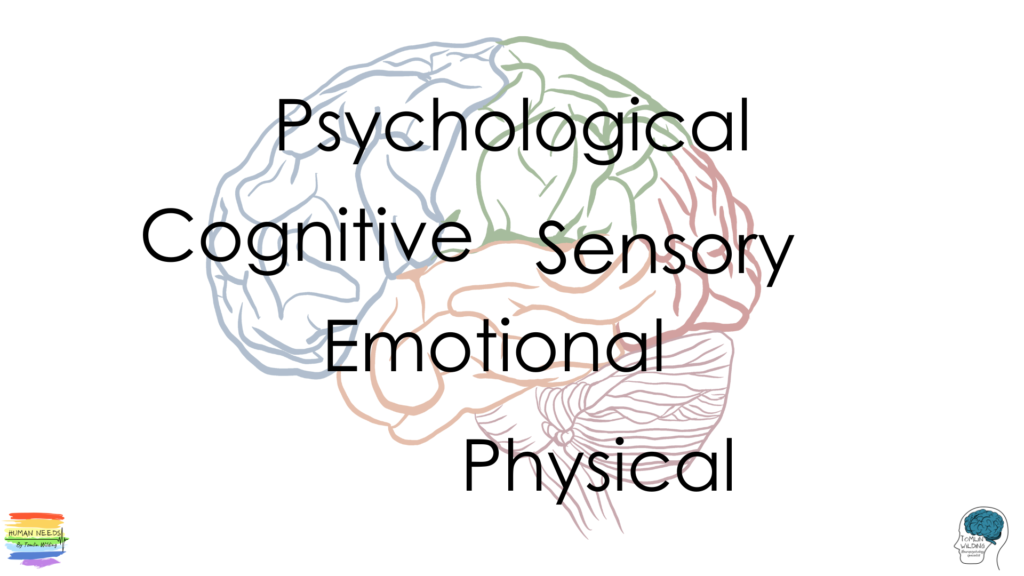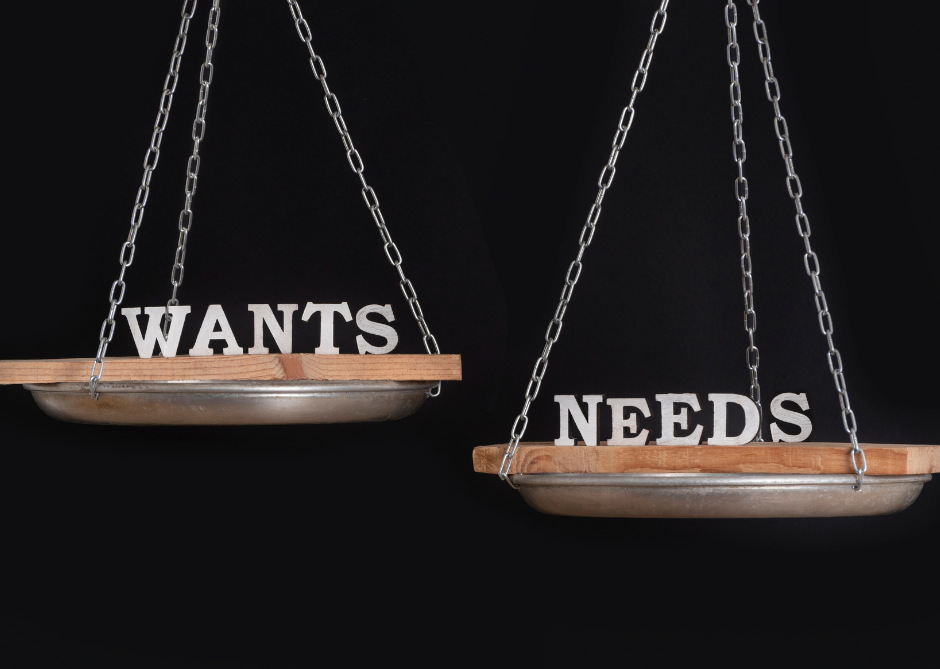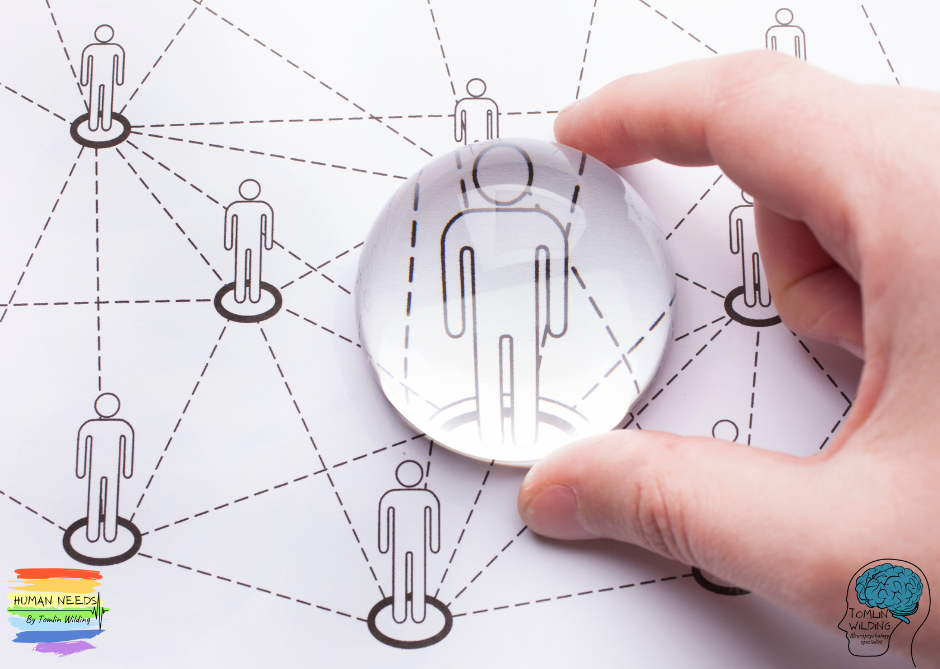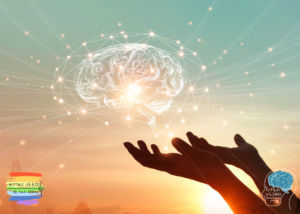Defining human needs
Human needs are consistently defined as something necessary for a human being to live a healthy life, and survive. Also, it is agreed widely that there are needs that are objectively necessary for survival, like food, water and air, and there are those aspects that are more subjectively considered necessary, like living in a community.
We can measure how quickly a human will die without these objective needs, but the subjective ones are more complicated to measure, though not impossible. These are psychological needs, and so the outcomes of their removal is less predictable. However, we do know that there are essential psychological drivers without which humans cannot live healthy lives. Why would they be a need? We know that human psychology is so intertwined with our physical health that we can also actually die from persistent and extreme detriment to our mental health. If we are prevented from acting in the way in which we are wired, our other areas of regulation, even our physical health, will decline.
How we measure and categorise these needs is not simple, and somewhat a matter of opinion. For the many psychologists that have studied our psychological needs, it is widely agreed that human needs are drivers of human behaviour. Psychologists believe that needs equal motivation.
Neuropsychology defining needs
When I look at this, I like to think about brains, and how our brain wiring makes us behave. This is because, though I love to study human behaviour, it still leaves me asking why, and this leads me to “what is happening in the brain that makes us all behave that way?”. This is neuropsychology and it’s my jam. I love it. So let’s start with the brain.
Our brain stem is all about physical homeostasis (keeping us alive), safety (protection from harm), and predicting our environment. The mid-brain is where we experience emotions and information from our senses, as well as basic communication that enables us to make attachments and be part of a community-based mammal species. The focus of this part of the brain is on relationships, meaning and belonging, and how we relate to community, our environment, and contribute with other humans. Physical skills start happening here too.
Finally, our neocortex is where our cognitive processes are at their most complex and where we can be logical, and rational. It is where we consider and control our behaviour, where we are creative, and where we learn and develop complex skills and concepts. It is also where we are most independent, individual, and, because it is where we can soothe and control our own behaviour, it is where we hold ourselves and others to our self-created values.
The five areas to be regulated
This leads me to the conclusion that we have needs in five main areas:
- our physical body
- our senses
- our emotions
- our cognition (processes of thinking)
- and our psychology (what our brains are motivated towards).
Furthermore, our psychological needs are those aspects we are wired to do beyond trying to regulate our other four areas. Please read my theory overview here to discover these needs, or explore this site in full.
This supports needs as drivers of behaviour, and so it is essential that we understand the difference between wants and needs.

Wants or needs
Yes, human beings do things and seek things because they “want” them, which feels like something different from a need. However, what we are growing to understand is that everything that we do, and/or seek out, we are driven to do, by a fundamental need.

Here, I would like to give an example that arose with my daughter, who is at University studying Fashion. She came home and told me her lecture was incorrect because it stated that the desire for fashion was not driven by a need. She was told this was because it does not appear in Maslow’s hierarchy. It was stated that a human being does not fundamentally need high fashion to survive; this is true. To this point myself and the lecturer agree. Unfortunately, the lecturer also said that a desire for new things is not a need. My daughter has heard me talk about human needs for nearly a decade now and although she didn’t choose to contradict her lecturer, she knew that there were other needs at play here, of which the lecturer was unaware. She wanted to explore them with me.
Understanding that all our behaviour is driven by a need in our brain (what we are wired to do), it is clear that we need to dig deeper to understand the behaviour of “buying high fashion”. If the psychologists (and myself) are correct, the desire to purchase high fashion must be driven by our human needs, otherwise we wouldn’t do it. So are we right?
Not only do I believe that we do have a psychological need for novelty (new), I also think the lecturer has missed some other key needs involved. Fashion represents a modern means to meeting psychological needs that would have been met in other ways in our past.
Identifying human needs in this case
Buying clothing definitely meets a need. We need to regulate our temperature and protect our body from harm. The simple physical need is met through acquiring clothes and shoes. But why would we buy anything other than the basics? Buying fashionable clothing potentially meets psychological needs that the lecturer had not considered. Let’s identify these.
Neuro-psychology
Firstly, our brain is wired to seek familiarity and a sense of safety. I choose to identify these needs as: predictability and protection. Maslow doesn’t mention predictability in his theory but other human needs theorists have, and his need for safety is similar to that of protection.
Secondly, our brains are wired to live in communities in which we:
- Build relationships
- Feel accepted
- Work as a team
- Contribute
- Have roles.
Further to this, we are wired to make complex judgements, including in our social cognition. This leads me to conclude that we have two important needs: the needs for connection and recognition. Maslow discusses one aspect of the need for recognition, calling it esteem. He spoke of respect, status and achievement. He also mentions connection but calls it love and belonging.
Lastly, the neocortex, as described in the beginning of this article, seeks to develop and experiment, needing variety and to push into new areas. It seeks out individualism; humans need to represent themselves authentically and autonomously. These are our human needs for novelty and autonomy. These are often mentioned by people who are expanding Maslow within the need for self-actualisation, and are mentioned by other theorists.
Behaviour
Wearing certain clothes can make us feel more or less noticed, and can determine what other people notice us for. Do our clothes identify what role we have in the world, or what we might have achieved? Clothes can help us feel respected and confident and, in my terms, helps us to be recognised as a certain type of human. The purchase of specific clothes can tell others about our status.
Humans often use external indicators of what communities or groups they belong to. This is sometimes as obvious as a uniform or team-kit, but is also more subtle, such as in their choice of particular designers. We use style to identify to whom we are most connected, and to indicate where we come from, or what we believe. Our need for connection to specific groups may lead us to purchase specific clothing.High fashion represents the newest and most inspiring forms of fashion at any time, and choosing to use it to express yourself displays individuality. Purchasing high fashion meets our needs for novelty and autonomy. Conversely, though predictability and protection needs could be met through clothing, I cannot see how someone would be driven to high fashion by those needs.
The point is that although we don’t always choose the simplest and most basic, or even the healthiest, answer to meet our needs, we are actually always driven to do what we do, or make the choices we make, by trying to regulate our needs.
The natural principle
When I considered the five areas in which humans have needs, it became clear that there is a pattern. There is a basic principle to our needs in the more “basic” needs that we understand well. That principle is that of regulation. When we think about our physical, sensory and emotional needs we understand that we need:
- Enough nutrition, but not too much
- The correct respiration rate, but not the same all the time, sometimes fast, sometimes slow
- To be able to take in information from our environment through our senses, but not too much at once
- To have appropriate emotions, but not be overwhelmed by them.
How do we prove that something is a need?
There are several things we must do:
- Keep asking “why do people do this”, and “what do they really need” until we get to something our brain is clearly wired for.
- Listen to people’s experiences of their own and others’ behaviour, look for patterns, and learn.
- Discuss theories of what that person needed and get their honest and complete feedback.
- Observe what dysregulation looks like and the mechanisms for regulation humans display.
- Study what makes humans dysregulated.
- Study brains, and specifically what fires neurons for all humans.
So, what is a human need?
A human need, is “an innate and in-built requirement for each human to thrive in our current stage of evolution.”
It is clear to me that in order for something to be classified as a need, it must be something that universally drives all humans to some extent, and in certain circumstances, in order to thrive. Thriving as a human being does not and cannot be a perfect state of being, because nothing is permanent, nor would be best served by being static. Therefore, at the most basic level, humans need to be regulated. They need to oscillate between states within a spectrum, and to constantly correct towards relative balance. The aspects of being human that need regulation include:
- Physical body
- Emotions
- Senses
- Cognition
- Psychology
Understanding that every human needs to be regulated is a good start, but more detail in useful and careful categories will make this much more helpful. For instance, within psychological regulation, we need:
- Regulation of the other areas above
- Protection
- Predictability
- Connection
- Recognition
- Novelty
- Autonomy
In future articles I will continue to explore the details of the categories of human needs within these five aspects, and their complexities. To get started, you can read the overview of my theory here.




